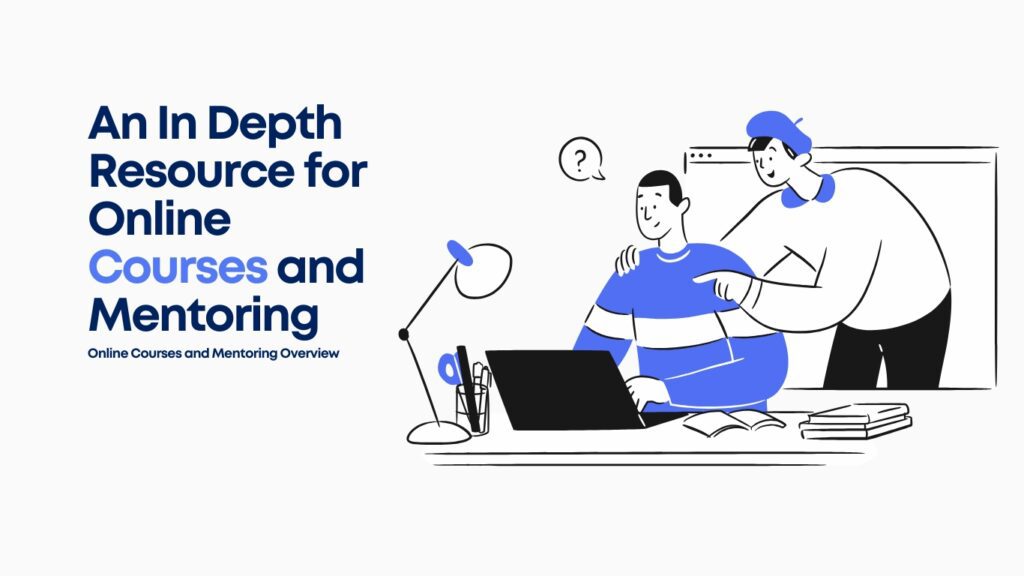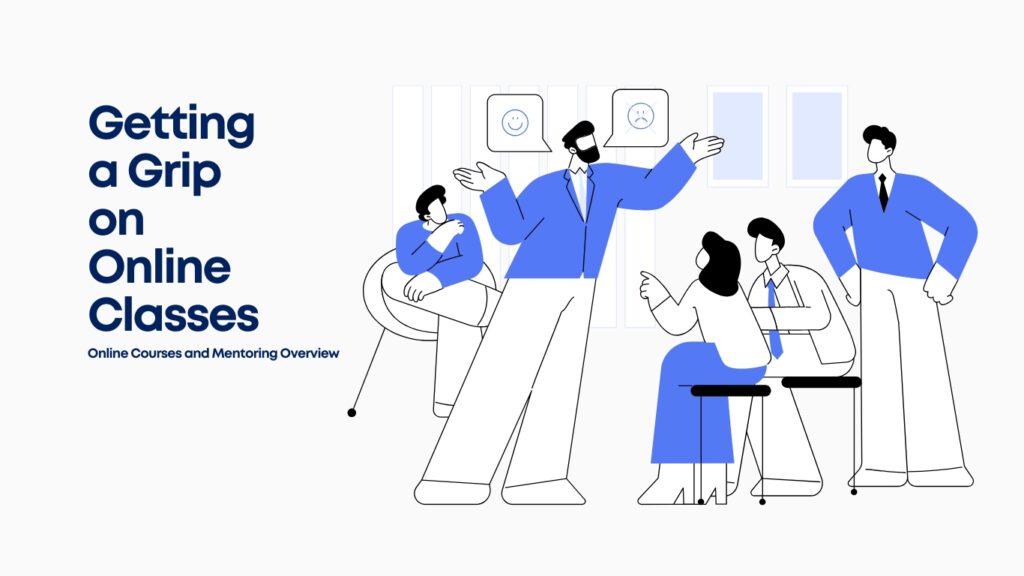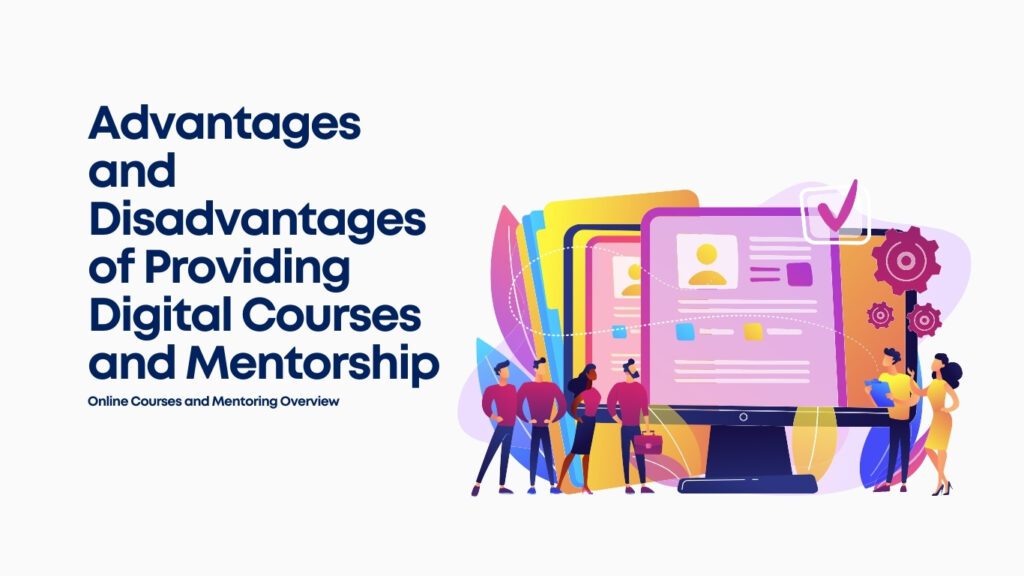Online Courses and Mentoring Overview
There has been a meteoric rise in the popularity of online education in the last several years. A growing number of people are looking for ways to improve their digital skills and personal growth. One successful strategy is to give mentorship and create online courses. This may be a great way to earn money share knowledge and establish one’s personal brand. If you have a passion for teaching or are a professional seeking to expand your income streams this guide will walk you through the steps of creating and growing your own online mentoring program and digital course.

Getting a Grip on Online Classes
A digital course is a collection of interconnected learning modules offered online that cover a specific topic or body of knowledge. There is a wide variety of course lengths available from intensive multi-week programs culminating in certification exams to more condensed video lessons.
Significant Elements of an Effective
Online Course: Clear and Specific Learning Outcomes: Make sure that students know what they will achieve by the conclusion of the course.

Video classes quizzes tasks and downloadable resources can all be used to keep learners engaged with the content.
High-Quality Production: Use only professional-grade audio and video. People will think your course is more valuable because of this.
Provide students with Access to Community: A forum or private social media group is a great way to bring people together and foster a supportive learning environment.
What You Need to Know to Make Your Own Online Course

1. Determine Your Specialization and Target Market: Pick a Field in Which You Are Both Enthusiastic and Skilled. Learn the ins and outs of your intended audience by conducting research.
2. Develop the Curriculum: Make sure the course flows logically by breaking it down into modules or lessons. Example: get a handle on the basics first then go on to more complex ideas.
3. Pick the Right Platform: Many well-known platforms provide different tools for hosting and selling online courses. Some examples are Teachable Thinkific Udemy and Kajabi. Price reach and user interface are different for each.
4. Construct Content: Use a top-notch camera and microphone to record video tutorials. Make use of screen-sharing applications to showcase your wares and polish your films to perfection.
5. Determine Price: Prices have a significant role in determining the success of your course. Think about how much value you’re adding how much money your target audience has and how much other courses like yours cost.
6. Launch and Promote: Reach out to potential students through social media email marketing and partnerships with influencers or blogs. During the debut provide discounts to entice initial clients.
Gather feedback after launch to improve content and delivery.
7. Iterate based on input. The course can be improved and made more user-friendly for future students through iteration.
One-on-One Guidance: Mentorship
Personal one-on-one or small group instruction and encouragement are at the heart of mentoring relationships. Students who are looking for individualized guidance in their chosen subject or profession will find it especially helpful.

One advantage of providing mentoring is the increased perceived value it offers compared to courses. This is because of the one-on-one attention that mentors give their mentees.
Fosters Connections That Last: Stronger relationships with clients fostered through mentoring increase the likelihood of repeat business and word-of-mouth advertising.
The ability to adapt: Mentorship sessions are more flexible than scheduled courses since they may be tailored to meet the needs of each individual.
Mentorship Program Development Process

- Define Your Expertise: Think about what you’re good at and where you can make the biggest impact whether that’s career coaching starting your own business or having industry-specific knowledge.
- Plan the Program: Figure out if you’ll be offering one-time sessions monthly packages or a program that lasts longer. Establish the pattern medium (email support video calls) and results.
- Mentorship fees can range from very little to very much depending on factors including your level of expertise the nature of your business and the duration of your program. Do some market research on comparable services and charge a fair price that covers your costs and shows how much value you provide.
- Plan Your Promotion: Make sure others know about what makes your mentoring program special by highlighting your background previous successes and the individualized attention your mentees receive.
- Make Use of Mentorship Platforms: Clarity.FM CoachAccountable and Zoom are some examples of platforms that may be utilized for mentoring. These platforms allow you to organize sessions payments and client progress.
- Acquire Testimonials: When mentees provide you with positive comments and testimonials it can improve your credibility and bring in new clients.
Advocating for Your Online Courses and Mentorship Initiatives

1. Make Use of Social Media: Post instructional videos student reviews and insights on sites like Instagram LinkedIn and YouTube. In addition to attracting students, this will assist you develop your credibility.
2. Join a YouTube Channel or Blog: Post helpful free stuff that is connected to what you’re learning in your class or from your mentor. By doing so you establish yourself as an authority in your field and attract potential customers to your premium services.
3. Create an Email List: Utilize a landing page to gather email addresses of prospective students then provide them with early access to courses or unique content in exchange for their email.
4. To reach the audience of influential people in your niche you should work with them as a partner. Reviewing interviewing or posting about your courses on social media are all ways they can market them.
5. No-Cost Seminars and Webinars: One method to attract potential students to highlight your teaching style and offer them a taste of your course or mentorship value is to host free webinars.
6. Video editing software Camtasia audio editing software Audacity and the graphic design tool Canva are all part of the digital course and mentoring toolkit.
7. Thinkific Teachable and Podoc are three examples of learning management systems (LMS).
8. Marketing Tools: Social Media Management by Hootsuite Landing Page Creator by ClickFunnels and Email Marketing by Mailchimp.
How Much Money Are You Bound to Make?
A lot depends on your pricing strategy the size of your audience and the caliber of your material when it comes to the potential earnings. With regular promotion and an enticing course offering a digital course can make anywhere from $1000 to $10000 monthly. Monthly client earnings from high-priced mentorship programs can range from $2000 to $5000.

Coaches can earn up to $100000 per year from one-on-one mentoring and entrepreneurs can make six figures from their online courses. Nevertheless, a substantial initial expenditure of time and content creation is necessary to achieve these outcomes.
Tips for Achieving Your Goals Focus on Value: Make it a point to go above and beyond what is expected in your classes or mentorship programs.
Keep Up to Date: Things move at a breakneck pace in the digital world. You should make sure to regularly update your course content to include the most recent trends and tools.
Interact with Your Class: Facebook or Discord can be used to create a support group where students can ask questions receive updates and form a community focused on your course.
In summary
Your information can be shared your audience may be reached globally and you can generate a sustainable income through digital courses and mentorship. Building a successful internet business from your knowledge requires careful planning constant advertising and an emphasis on offering genuine value. In the realm of digital education, the sky is the limit whether youre just starting out or want to build a massive online university.
Asking Questions About Online Classes and Mentoring
Digital classes are what?
The term digital course refers to a set of interconnected learning modules offered by various online providers. Learners can acquire new abilities without leaving the comfort of their homes with programs that vary from short video tutorials to multi-week programs that include tests and downloadable resources.
What factors contribute to the success of an online course?
Essential components include well-defined goals for learning interesting and interactive content (videos quizzes tools) quality professionally produced materials and a welcoming community to help students stay motivated and engaged.
Finally, how do I design an online class?
Find your speciality and who you want to reach first. Create a course outline select a platform (e.g. Teachable or Thinkific) record video lessons determine course fees and advertise the class via email and social media. Continuously enhance the course by incorporating comments.
In the digital realm, what is mentorship?
Mentoring entails guiding a person or small group through a process that is both structured and informal. It provides more personalized attention than recorded classes and can cover a broad variety of topics.
What are the steps to begin a mentoring program?
Set a price to advertise the program outline your area of expertise and plan the mentorship sessions (length format outcomes). To schedule tasks and gather feedback use a tool like Clarity. Fm.
What kinds of platforms are available for hosting online courses?
A few popular platforms that can cater to your demands include Teachable Udemy Thinkific and Kajabi. These platforms offer a variety of features such as video hosting quizzes and marketing tools.
What is the best way to set a fee for my online course or mentoring?
Examine comparable course prices the amount of content covered and the budget of your intended audience. The price of a digital course can be anywhere from fifty dollars to five hundred dollars or more while the cost of a mentoring program can be fifty to three hundred dollars an hour or more.
How can I advertise my mentoring programs and online classes?
The use of social media blogs YouTube channels email lists free webinars and influencer collaborations can be enhanced. In order to entice new students during the debut phase it is recommended to highlight testimonials and give discounts.
What are the potential earnings from online courses and mentoring?
Price and audience reach determine earnings. Particularly for those with in-demand and specialized knowledge mentoring can bring in $2000 or $5000+ per client monthly while courses can earn $1000 or $10000+ per month.
How can I make sure that the courses I take are of excellent quality?
In order to create a course you should utilize Camtasia to edit videos Audacity to edit audio and Canva to edit graphics. Marketing tools such as Mailchimp and ClickFunnels are helpful for email marketing and landing page creation respectively.
Why should I provide mentorship in addition to online courses?
Mentorship provides more value and on one assistance while digital courses attract a large audience and generate passive income. When combined they have the potential to establish a steady flow of income and elevate your status as an authority in your field.
What steps can I take to ensure that my online course is always current?
Make sure you regularly assess the content incorporate current industry trends into the videos and pay attention to student feedback. Ensuring students get the most up-to-date material and that the course remains relevant requires periodic updates.
Advantages and Disadvantages of Providing Digital Courses and Mentorship

Advantages:
1. Scalability: Digital courses can be marketed to an infinite number of students producing passive money with negligible supplementary effort.
2. Flexibility: You can produce material once and disseminate it multiple times thereby liberating time for additional initiatives or mentorship.
3. Global Reach: Digital platforms enable access to learners globally broadening your audience beyond local confines.
4. Significant Earning Potential: With appropriate content and marketing courses and mentorship can yield substantial profits, particularly in specialized industries.
5. Brand Building: Positioning oneself as a course designer or mentor can enhance expertise hence augmenting credibility and repute.
Disadvantages:
1. Preliminary Time Commitment: Developing high-quality courses necessitates considerable time for planning recording and editing.
2. Competition: The online education sector is saturated rendering it difficult to differentiate without proficient marketing strategies.
3. Content Maintenance: Courses necessitate periodic revisions to remain pertinent which may demand continuous effort.
4. Marketing Challenges: Effective course sales necessitate investment in marketing advertising and social media tactics.
5. Mentorship Fatigue: Customized mentorship may become laborious and exhausting if one assumes an excessive number of customers simultaneously.
Integrating digital courses with mentorship can alleviate certain obstacles while leveraging the benefits of both approaches. Advantages and Disadvantages of Providing Digital Courses and Mentorship

Pingback: 20 Best Ways to Start Making Money in 2025 - AP Design Blog